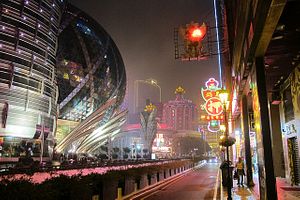In Macau, a special administrative region (SAR) of China known for its gambling industry, more than 80 percent of local revenues are earned by the operation of casinos or gambling-related businesses. However, due to the outbreak of the COVID-19 pandemic, Macau hosted just around 3 million tourists in January and February, down 56.9 percent year on year. Gambling revenue plunged by 79.7 percent year-on-year in March. The significant drop in gambling-related earnings has been largely attributed to both Macau’s proximity to mainland China, where the outbreak of COVID-19 originated, and the Macau Government’s decision to close the border in phases from mid-to0late March, barring non-Chinese nationals as well as those from Greater China from entry.
Chief Executive of Macau Ho Iat-seng reported that gaming revenues for the first three months of 2020 saw a 60 percent year-on-year fall to about 30.49 billion patacas (US$3.81 billion). Since gaming revenues are expected to stay low for the rest of the year due to the uncertainty of the public health crisis, the government has cut Macau’s gross gaming forecast for 2020 by half, to 130 billion patacas (US$16 billion).
It is noteworthy that visitors to Macau from the Greater China region — including mainland China, Hong Kong, and Taiwan — account for over 90 percent of local tourists. Therefore, the recovery of Macau’s gambling industry and businesses dependent on it will remain limited unless travel bans and restrictions are lifted and potential Chinese visitors are confident that COVID-19 is contained in the SAR. Even if restrictions on visas and transportation are lifted, business should remain slow as Chinese gaming players are probably unwilling to travel at this point. Yet, if Macau and the Greater China region can contain the first wave of the COVID-19 outbreak and prevent a second wave, then tourism in Macau would recover slowly.
From April 11, Macau has been recording zero COVID-19 cases, with Ho arguing that the pandemic in the SAR is basically contained. He noted that border restrictions will be lifted in phases if Macau can maintain zero new cases until the end of April. To save the local economy, it is crucial for Macau to cancel its travel restrictions against nationals from the Greater China insofar as casinos and other business apply strict COVID-19 preventive policies, such as temperature checks, requiring face masks, providing hand sanitizer, and so forth. As the world’s largest casino hub, attracting more visitors from Greater China can help boost local and national economic growth. With the border reopened, not only casinos but the many gaming-related businesses in Greater China, such as travel agencies and transportation companies, and alternative businesses in Macau, including those within the retail sector, have a hope to rebound.
On April 9, Macau Secretary for Economy and Finance Lei Wai Nong announced that the government will allocate a 10 billion patacas (US$1.3 billion) COVID-19 economic relief fund for businesses and individuals. When public health and safety can be assured and more visitors from Greater China are willing to enter Macau, fewer financial resources will be needed for local businesses and citizens.
Macau might continue to restrict foreign nationals from entering in order to prevent imported COVID-19 cases. However, once public health within the Greater China region is stabilized, Macau Government should in phases permit citizens from mainland China, Hong Kong, and Taiwan to visit the city in order to boost the local and China’s national economy.
Jason Hung is a researcher and writer who held research appointments at Stanford University, University of California, Berkeley and King’s College, London.

































